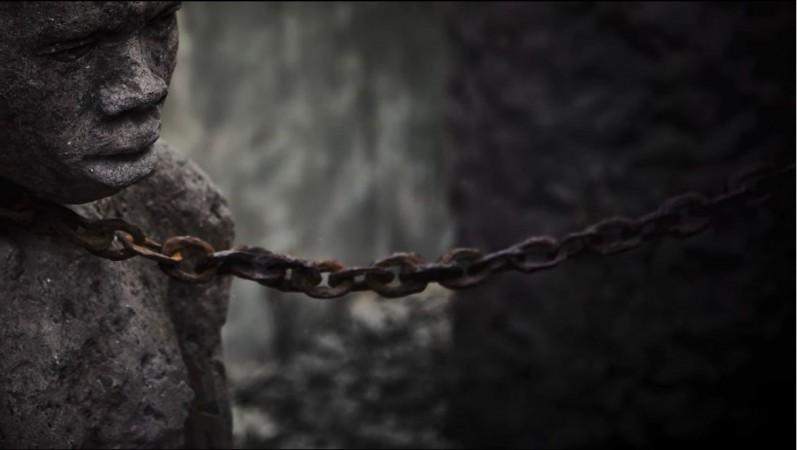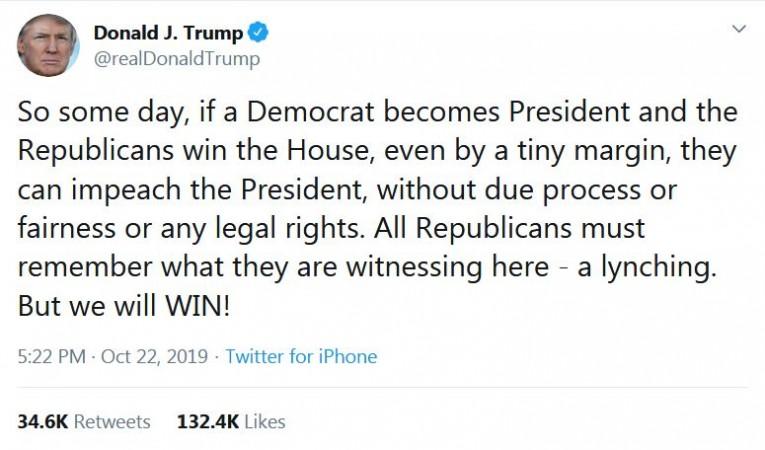
Kins of Emmett Till and Willie Edwards Jr, who were subjected to racial killings and later became icons for the Civil Rights movement, condemned US President Donald Trump's 'lynching' remark on his impeachment probe.
Deborah Watts, a cousin of Till who was 14-year-old in 1955 when he was beaten to death and dumped in a river in Mississippi after he was accused of offending a white woman, said the comment was "insensitive and offensive".
"Lynching is the ultimate act of racial terror that resulted in the brutal murders, trauma and terrorism that my cousin Emmett and thousands of innocent black men, women and entire communities of colour suffered for hundreds of years," she was quoted as saying by the Associated Press.
The daughter of Willie Edwards Jr who was forced to jump to his death from a bridge by members of the Ku Klux Klan in Alabama in 1957 said Trump's tweet was "very racist and just doesn't care" about the plight of the black community.
"Either he's very ignorant or very insensitive or very racist and just doesn't care," said Malinda Edwards, 66.
"Unfortunate choice of words"
Trump on Tuesday while referring to his impeachment probe wrote on Twitter, "All Republicans must remember what they are witnessing here - a lynching. But we will WIN!"

An impeachment inquiry aginst Trump was announced last month following a controversial phone call with Ukrainian President Volodymyr Zelenskiy to investigate former Vice President and Presidential candidate Joe Biden and his son Hunter Biden, who was on the board of a Ukrainian gas company.
The use of the term 'lynching' carries cultural sensitivity in the US as thousands of people majorly from the black community were subjected to racial killings especially in southern states who wanted to maintain black slavery. The Civil Rights movement during the 1950 and mid-1960s led to US constitutional and legal rights for equality of the African American community.
"The President should not compare a constitutionally mandated impeachment inquiry to such a dangerous and dark chapter of American history. It's irresponsible for him to do so, and I hope that he will apologise," said House Democratic Caucus Chairman Hakeem Jeffries according to Reuters. Jeffries is an African American.
The comment was criticised by figures from the Republican party as well, Senate Majority Leader Mitch McConnell. While he supported Trump views of the "unfair process" taken by the Trump's impeachment inquiry committee, he said "Given the history in our country, I would not compare this to a lynching. That was an unfortunate choice of words."
However, Republican Senator Lindsey Graham defended Trump despite his home state, South Carolina having a large black population. "It shows a lot of things about our national media. When it's about Trump, who cares about the process, as long as you get him. So, yeah, this is a lynching in every sense. This is un-American," he told reporters.
History matters
His comments came days before his scheduled visit to Benedict College in South Carolina for the 2019 Second Step Presidential Justice Forum. The school is historically known as its students had participated in the established National Association for the Advancement of Colored People (NAACP) chapter in 1937 to support a civil rights campaign against lynching.

A 2015 report by the Equal Justice Initiative revealed that between 1877 and 1950 some 4,084 lynchings of black people had taken place in the US.
Investigation of both Till And Emmett's murders, despite being key figures that led to the civil rights movement, have led to no prosecutions till date with all suspects who have died over the years.
Edwards's daughter says such comments by the President shows indifference to the lynchings and a history of suffering.
"It says to them that 'What happened to you is like nothing more than an investigation.' These are people who went through the most gruesome and heinous things that could be done to them," said Malinda.









!['Had denied Housefull franchise as they wanted me to wear a bikini': Tia Bajpai on turning down bold scripts [Exclusive]](https://data1.ibtimes.co.in/en/full/806605/had-denied-housefull-franchise-they-wanted-me-wear-bikini-tia-bajpai-turning-down-bold.png?w=220&h=138)



